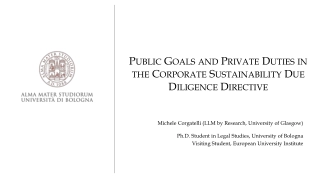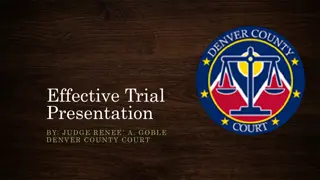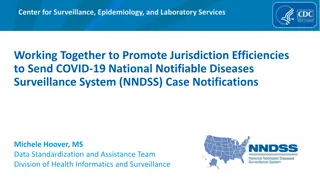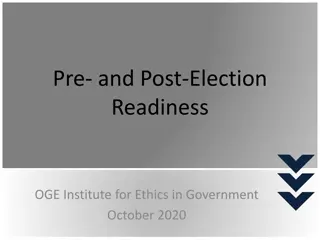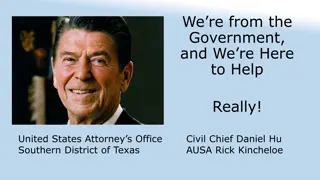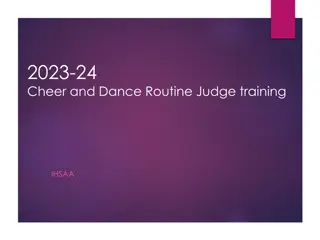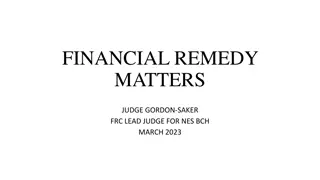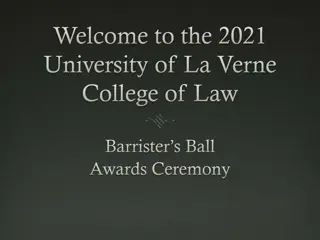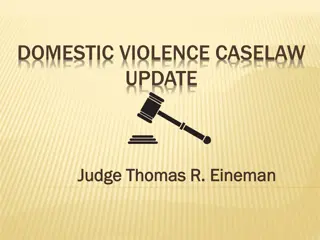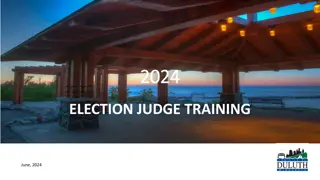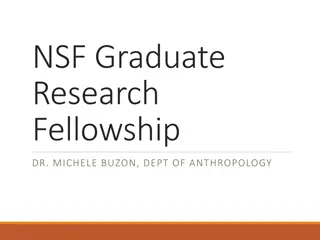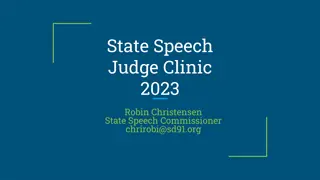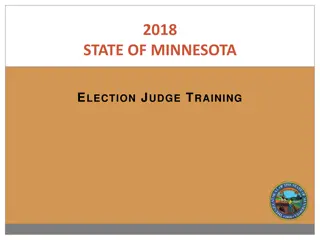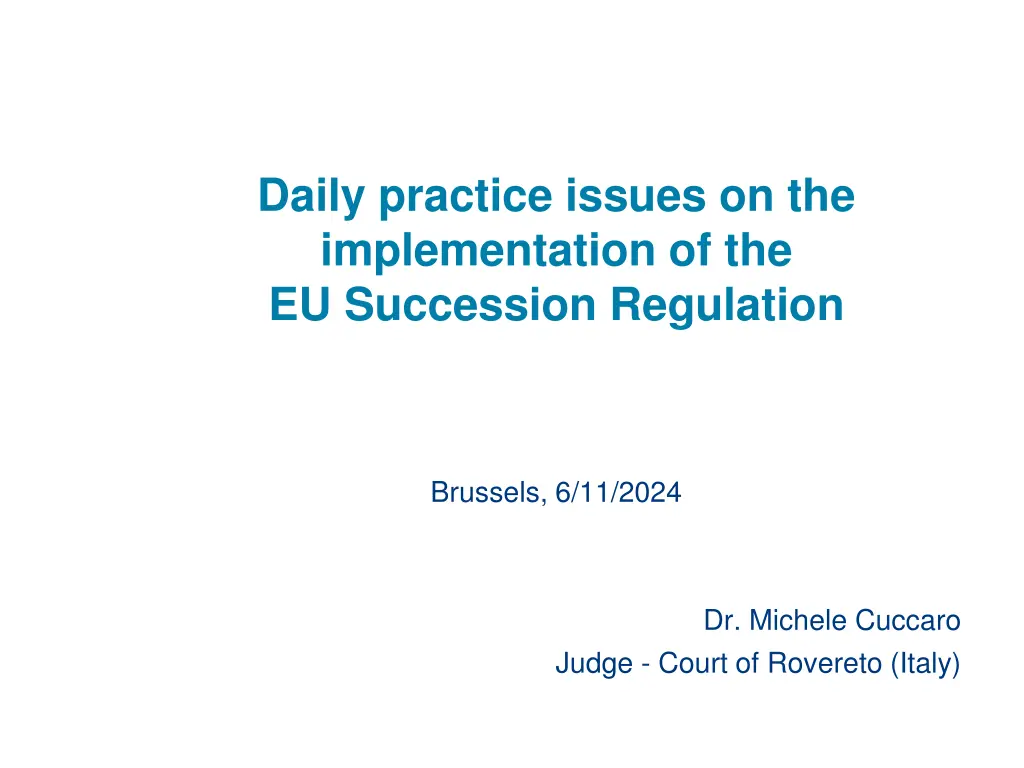
Legal Interpretation ECJ C-354/21 German-Lithuanian Inheritance Case
Explore the legal complexities of the ECJ C-354/21 case involving a German woman's estate in Lithuania, touching on issues of incomplete information in the European Certificate of Succession and the Advocate General's opinions on the application of Regulation No. 650/2012.
Download Presentation

Please find below an Image/Link to download the presentation.
The content on the website is provided AS IS for your information and personal use only. It may not be sold, licensed, or shared on other websites without obtaining consent from the author. If you encounter any issues during the download, it is possible that the publisher has removed the file from their server.
You are allowed to download the files provided on this website for personal or commercial use, subject to the condition that they are used lawfully. All files are the property of their respective owners.
The content on the website is provided AS IS for your information and personal use only. It may not be sold, licensed, or shared on other websites without obtaining consent from the author.
E N D
Presentation Transcript
Daily practice issues on the implementation of the EU Succession Regulation Brussels, 6/11/2024 Dr. Michele Cuccaro Judge - Court of Rovereto (Italy)
With my speech Id like to: briefly share with you my experience in the field of ECS as an LR judge and as a judge in charge of issuing national certificates of succession; give you a follow-up on my participation, as member of the Italian delegation, at the Transnational Forum Alpe Adria which took place last Autumn in Gorizia and where notaries, university professors and judges from Austria, Croatia, Italy and Slovenia convened to debate on the very topic of Daily practice issues on the implementation of the EU Succession Regulation .
1. Incomplete Information in ECS ECJ C-354/21 A woman living in Germany died, leaving as her sole heir her son, who also lives in Germany. She owned immovable property in Germany and Lithuania. Her son obtained a ECS from the German authorities, naming him as the sole heir of the deceased s entire estate. He presented the certificate to the Lithuanian authorities and applied for the immovable property to be recorded in the LR. They refused to do so on the grounds that the certificate was incomplete. The Supreme Administrative Court of Lithuania raised a request for a preliminary ruling
OPINION OF ADVOCATE GENERAL SZPUNAR (ECJ C-354/21) In short, the solution to the problem in this case is as follows: either the German authorities are required by virtue of the provisions of Regulation No 650/2012 to specify, in the European Certificate of Succession, the property in question or the Lithuanian authorities are required by virtue of the provisions of Regulation No 650/2012 to admit the application on the basis of the European Certificate of Succession issued by the German authorities
OPINION OF ADVOCATE GENERAL SZPUNAR (ECJ C-354/21) Point (l) of Article 1(2), point (l) of Art. 68 and Art. 69(5) of Regulation (EU) No 650/2012 preclude the application of provisions of national law pursuant to which an immovable property acquired by a sole heir pursuant to a right of succession governed by the principle of universal succession can only be recorded in the Real Property Register of the MS in whose territory that asset is located on the basis of a ECS if all the data required under the national law of that Member State to identify the immovable property are included in the certificate
Decision (ECJ C-354/21) Article 1(2)(l), Articles 68(l) and 69(5) of Regulation (EU) No 650/2012 must be interpreted as meaning that they do not preclude legislation of a Member State which provides that an application for registration of immovable property in the land register of that Member State may be rejected where the only document submitted in support of that application is a European Certificate of Succession which does not identify that immovable property.
Austrian solution on the issue of incomplete information in ECS This year, the Austrian Supreme Court ruled that even if an ECS doesn t list the exact property details (like parcel numbers or cadastral communities), it can still be used to transfer ownership of that property to the heirs. This makes it easier for heirs to register their property rights, even when the ECS is issued in Germany, where such details are typically not included in the ECS
This is the solution I have always adopted as an LR judge when dealing with ECSs issued by the German authority and regarding immovable properties located on Lake Garda. The solution is obviously different when the certificate of succession involves a legacy. In this case, the specific indication of the property must be considered mandatory.
In any case, the solution proposed by the 2023 ENN Alpe Adria meeting remains valid National authorities issuing ECS should utilize the open-text box on Form V, Annex IV, No. 9 to list the assets that require certification according to the land register law of the Member State where the property is situated. This approach ensures that the ECS is comprehensive and self-sufficient, eliminating the need for citizens to submit additional documents along with the ECS.
2. Handling of National Certificates of Succession When national certificates of succession are issued by courts in accordance with Article 3(2) of the Succession Regulation, these certificates are recognized in other Member States without necessitating any additional, specialized procedures (as per Article 39 of the SR). However, in certain MS, there is a practice of requesting a declaration of enforceability in line with Article 43 and subsequent articles of the SR, or subjecting the decision to an exequatur proceeding.
In the above-mentioned ENN Alpe Adria meeting the delegation came to the conclusion that this practice deviates fromthe Regulation and should thus be avoided. The delivery of an exequatur is only necessary when seeking enforceability and should not be a mandatory requirement for the purpose of recording a decision in succession matters originating from another Member State in the land registers. Automatic recognition in accordance with Article 39 of the Succession Regulation should suffice for this purpose.
The recommendation was accepted by the Slovenian Supreme Court in case Kuzma (II IPS 24/2024 - 21/8/2024), which refuted the necessity for any enforceability certificate. Conclusion of the SC decision as a result of an erroneus application of the provisions of articles 43-45 EU SR and 227h Slovenian Inheritance law, the first and second instance courts erred in holding that the German joint certificate of succession on the basis of which registration was sought did not satisfy the conditions for registration under art. 148(2) ZZK-1 because it did not have the characteristic of enforceability
This ruling by the Slovenian Supreme Court is perfectly in line with the decision of a fellow judge of the Court of Trieste, who refused to allow the issuing of a certificate of enforceability that Slovenian LR authorities had required upon receiving an Italian Certificate of Succession intended to register a property in Slovenia
3. National Certificate of Succession and risk of parallel proceedings Parallel proceedings on the same succession and estate were quite frequent among Member States before the Succession Regulation entered into force. One of the major achievements of the Regulation was to effect a concentration of proceedings in only one Member State, most often the state of the last habitual residence of the deceased.
ECJ C-20/17 (Oberle) Art. 4 of Regulation (EU) No 650/2012 .... must be interpreted as precluding legislation of a Member State, such as that at issue in the main proceedings, which provides that, although the deceased did not, at the time of death, have his habitual residence in that MS, the courts of that MS are to retain jurisdiction to issue national certificates of succession, in the context of a succession with cross-border implications, where the assets of the estate are located in that MS or the deceased was a national of that MS.
ECJ C-80/19 (E.E.) Art. 4 and 59 of Regulation No 650/2012 must be interpreted as meaning that notaries of a MS, who are not classed as courts for the purposes of that regulation, can issue national certificates of succession WITHOUT APPLYING THE GENERAL RULES OF JURISDICTION laid down by that regulation. If the referring court finds that those certificates satisfy the conditions laid down in Art. 3(1)(i) of that regulation and can, therefore, be regarded as authentic instruments , within the meaning of that provision, such certificates produce, in other MS, the effects that Art. 59(1) and Art. 60(1) of Reg. No 650/2012 attribute to authentic instruments
Its easy to notice that the first decision certainly goes in the direction of avoiding the risk of parallel proceedings, while the second goes exactly in the opposite direction. ECJ C-20/17 (Oberle) ECJ C-80/19 (E.E.)
Schmidt As a result (of the ECJ C-80/19), a curious form of discrimination between national succession certificates now emerges. If the competence lies within a court, as is the case with the German Erbschein, then the certificate can only be issued by the court competent under the Succession Regulation. On the other hand, if it is issued by a notary, as is the case, for example, in France, Lithuania or Italy, such restrictions do not apply.
Schmidt In other words, notarial succession certificates are more freely accessible than judicial ones. Finding a justification for the described difference in treatment seems rather difficult, if not impossible, especially considering that at the European level, the national organization of judicial and administrative functions should not have any relevance
The 2023 Alpe Adria Meeting suggested that National authorities which do not qualify as courts under the Regulation should exercise restraint in issuing national certificates in instances where the deceased had the last habitual residence in another Member State. This will help prevent conflicts with the European Certificate of Succession (ECS), which is issued based on the relevant law and by the competent authority as stipulated in the Succession Regulation
Recommendation # 6 MAPE In order to prevent parallel proceedings in two (or more) Member States over the same estate regarding the same subject-matter, Member States should ensure that notaries and courts may verify whether the same question is not already dealt with by a notary or a court in another Member State. To that end, Member States could establish a register of pending and terminated succession proceedings. The Member States could together with the EU envisage the interconnection at European level of these national registers.
4. Language and Translation of the ECS When an ECS is presented to national authorities, they typically request a full or partial translation (particularly for open-text boxes) when it has not been issued in one of the official languages of the Member State where it is being presented. This translates into additional costs for citizens that could be reduced.
My decision as LR Judge (G.N. 2209/19) If the ECS contains relevant sections in a foreign language that are not easily understandable despite the use of the uniform models provided by Regulation (EU) no. 650/2012, the LR Judge, according to art. 89 LT, allows the annotation in the LR until the presentation of the translation , and sets a suitable deadline for the presentation of such translation
Recommendation ENN Alpe Adria Seminar Member States are encouraged not to compel their issuing authorities to issue ECS documents exclusively in their official language, and to adopt practices that facilitate the circulation of the ECS without the need for translation. Furthermore, translation shall only be mandated for the open-text boxes in the ECS, rather than for the entire document. This approach reduces costs and significantly eases the process for citizens

